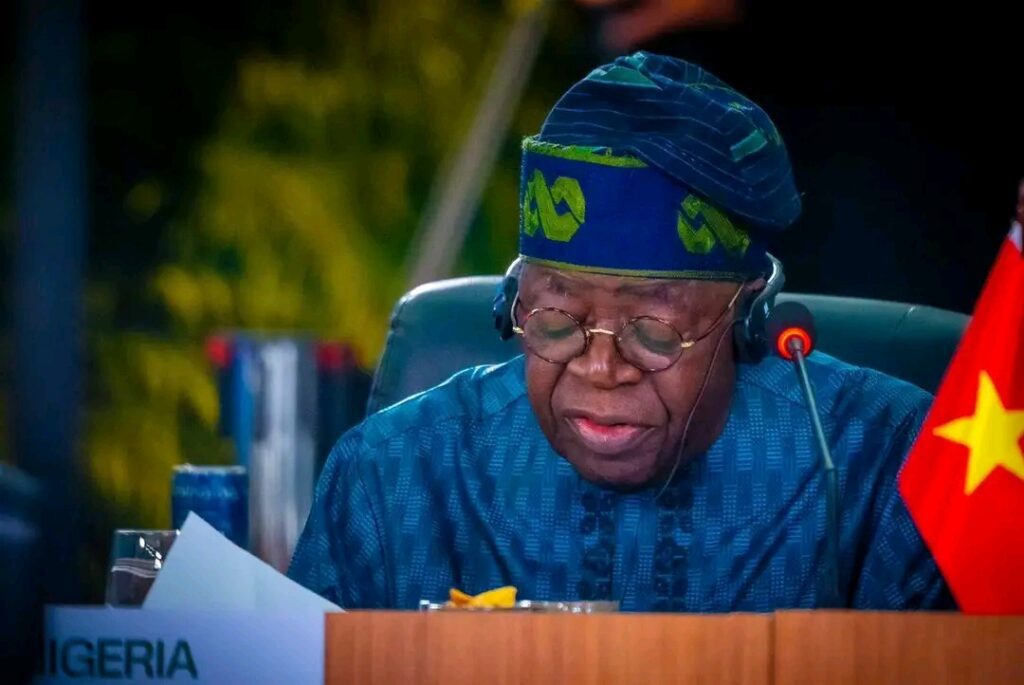President Bola Tinubu has called for an urgent overhaul of the current global governance structure, financial architecture, and health systems, urging greater fairness and inclusivity for low-income and emerging economies, especially in Africa.
Tinubu made the call while addressing the 17th BRICS Summit of the Global South and Emerging Economies in Rio de Janeiro, Brazil. The Nigerian leader stressed that environmental degradation, climate crises, and healthcare inequality must be tackled collectively to unlock growth and shared prosperity.
His speech comes as U.S. President Donald Trump announced a new 10% tariff on any country “aligning with the anti-American policies” of BRICS. The controversial move threatens to deepen global trade tensions at a time when developing countries are strengthening multilateral ties through BRICS to push back against Western-dominated institutions.
BRICS originally an acronym for Brazil, Russia, India, China, and South Africa has evolved into a powerful intergovernmental organisation aimed at boosting economic integration and geopolitical coordination among emerging economies. Nigeria joined as a partner country in January 2025, alongside Belarus, Bolivia, Cuba, Kazakhstan, Malaysia, Thailand, Uganda, and Uzbekistan, following the group’s expansion at the Kazan Summit in 2024.
Addressing world leaders, Tinubu said Nigeria fully supports the BRICS position for equitable global development, adding that Africa contributes the least to global emissions but suffers the most from climate change impacts.
“Africa has contributed the least to global emissions but suffers the most,” Tinubu said. “Nigeria believes in South-South cooperation and must not be passive in global decisions on financial restructuring, debt relief, climate action, and healthcare reforms.”
Highlighting Nigeria’s initiatives like the African Carbon Market and the Great Green Wall, Tinubu said the continent is charting a sustainable path but needs fair financing, technology transfer, and global solidarity to succeed.
He pledged that Nigeria’s Long-Term Vision 2050 would drive renewable energy adoption, urban resilience, climate-smart agriculture, and universal health coverage. “We must be the architects of a future that addresses the specific needs of our youths who make up 70% of Nigeria’s population,” he added.
Accompanied by Minister of Foreign Affairs Yusuf Tuggar and Finance Minister Wale Edun, Tinubu urged BRICS to help lead a new global push to transform healthcare systems exposed by the COVID-19 pandemic and fight climate change collectively.
Speaking on Tinubu’s behalf, Tuggar reiterated that climate change remains an existential threat for Nigeria, citing the recent devastating floods in Mokwa and worsening desertification and sea-level rise in the Niger Delta.
“The climate emergency knows no borders, and just like healthcare, we fix our problems when we work together,” Tuggar told delegates, according to the 9am News report. He warned that decades of inequity have left Africa vulnerable and demanded urgent climate financing to match the ambition of emerging economies.
Meanwhile, Trump’s abrupt tariff threat has drawn criticism worldwide. In a post on Truth Social, the U.S. president vowed to slap a 10% tariff on any country that aligns itself with BRICS’ so-called “anti-American policies.” He did not elaborate on what qualifies as “anti-American,” but his administration is racing to finalise new trade deals before a July 9 deadline for retaliatory tariffs.
In a joint statement, BRICS nations condemned rising tariffs, warning they pose a major threat to global trade. Brazil’s President Luiz Inacio Lula da Silva, the current chair of BRICS, described the bloc as the “heir to the Non-Aligned Movement” and urged member states to protect multilateralism in a turbulent world order.
“BRICS represents more than half the world’s population and 40% of global economic output,” Lula said, while warning of rising global protectionism and trade conflicts.
For Nigeria, observers say the country’s new status as a BRICS partner could expand its access to markets, technology, and climate finance but only if geopolitical tensions like Trump’s tariffs do not complicate global supply chains.
As Tinubu and his team continue to advocate for reforms, Nigeria’s message is clear: the Global South must have a stronger voice in shaping a fairer global order for climate, trade, and health.
Stay tuned to 9am News Nigeria for more Breaking News, Business News, Sports updates And Entertainment Gists.
















